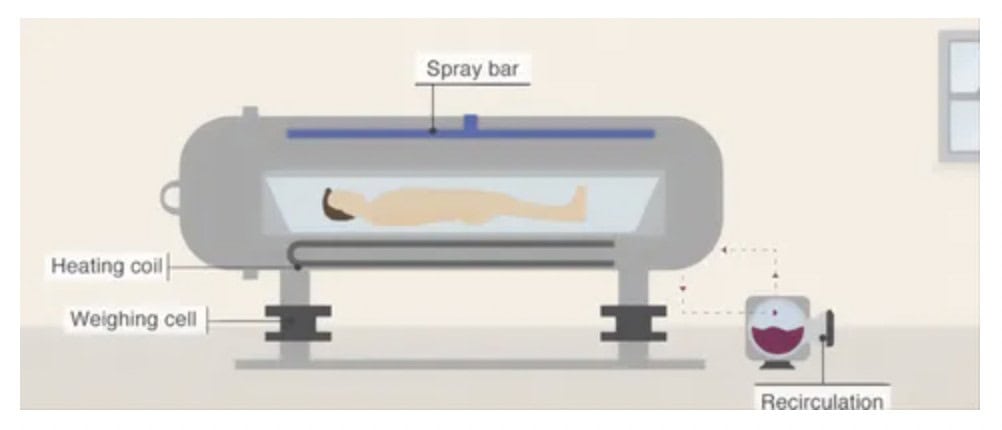The U.S. has some unique and sometimes bizarre funeral and burial laws that vary by state. Some of these odd rules reflect local historical, cultural, and legal nuances, and many are somewhat archaic and demonstrate the powerful lobbying of an industry worth $8 billion.
A funeral purchase was once one of the major spends an individual would make. Up there with a wedding, a mortgage, and a car. The average cost of a traditional funeral has hovered around $8,000 for the last decade, not including cemetery fees.

This means the potential full cost of a burial funeral could amount to a minimum of $12,000 [bear in mind that urban cemetery space is now very limited and expensive]. Still, it will likely cost near $20,000, with cemetery fees and all ancillary charges included.
The huge shift to simple cremation services and even online direct cremation arrangements should mean that the funeral industry reviews these ‘old’ laws and has a modernization overhaul.
The Legislation Shaping Death Care in America.
There are ten states that require a family to employ a funeral director to conduct some aspect of the death care process, thereby restricting the ability of a family to conduct a natural home funeral service.
In addition to that strange law, there are a variety of weird rules in different states that control such things as a funeral business operating a cemetery or crematory, who can sell caskets, who can discuss funeral arrangements, how long the waiting period should be before cremation, and even advertising restrictions.
That last one is the most bizarre rule enforced by some funeral boards in today’s era of Internet marketing, Google ads, and online price disclosures.
Here is an overview of some of the strangest funeral rules by state:

New York – Crematories Must Be Non-Profit
New York law mandates that crematories operate as non-profits. The rationale is rooted in the state’s belief that funeral-related services should not be profit-driven. This law makes New York one of the few states with such a restriction, impacting how cremation businesses operate.
Colorado – No Requirement for Licensed Funeral Directors
Unlike most states, Colorado did not require funeral directors to be licensed, which meant that individuals without formal training or certification legally performed funeral services. This law was extremely unusual, as most states mandate licensing to ensure professional standards. In most states, funeral establishments are regularly inspected, and specific standards of operation must be met.
However, due to the gruesome discovery of 190 bodies at an unregulated funeral home in Colorado last year, the Colorado Governor signed a bill in May 2024 to overhaul Colorado’s licensing statutes and bring the industry into line with standard funeral licensing requirements.
Louisiana – Licensed Embalmers for All Funeral Homes
Louisiana requires all funeral homes to have licensed embalmers on staff, even if embalming services are not offered. This can impose additional costs on funeral homes and consumers, especially for smaller operations. Some believe this regulation protects traditional embalming practices in the state, which is known for its cultural funeral traditions.
Virginia – Only Licensed Funeral Directors Can Discuss Funeral Arrangements
Virginia has strict regulations on who can discuss funeral arrangements with clients, limiting these discussions to licensed funeral directors only. This law prevents staff without specific funeral director licenses from providing any guidance or information on funeral services, an unusual restriction compared to other states that allow more flexibility in client communications.
Washington – Alkaline Hydrolysis Permitted

Washington state is one of the few states legally allowing alkaline hydrolysis, or “water cremation,” a process in which the body decomposes more naturally in a water-based solution. This eco-friendly alternative is not widely permitted across the U.S. due to lack of public awareness and legal approval in most regions. However, it is seen as a progressive and environmentally conscious option where allowed.
Alabama – Mandatory Grave Liners in Cemeteries
Alabama mandates using grave liners or vaults in cemeteries to prevent graves from sinking as the caskets decompose. This regulation, intended to maintain cemetery appearance and safety, is enforced even though it adds costs for families who may prefer traditional burial without additional barriers or liners.
Pennsylvania – Burial Within 24 Hours
In Pennsylvania, there’s an old law stating that bodies must be buried within 24 hours unless embalmed or refrigerated, which can be challenging for families needing time to organize services or transport. Though not strictly enforced today, it reflects historical public health concerns and remains in the books.

California – Limited Home Burial Options
California has strict regulations prohibiting home burials, requiring all burials to occur in cemeteries. Home burials, which are more common in rural areas of other states, are not allowed here due to state zoning and health regulations, pushing families to seek burial plots even if they prefer more personal options.
These laws highlight the diversity of funeral regulations across the U.S., often balancing public health concerns, cultural practices, and business interests in the death care industry.
Detailed below are states that have restrictive casket and cremation urn retailing rules.

Georgia – Only Funeral Directors Can Sell Caskets and Urns
In Georgia, only licensed funeral directors are legally allowed to sell caskets and urns. This law effectively gives licensed funeral homes a monopoly on these items, restricting other retailers or online vendors from entering the market and limiting options for consumers who want to buy merchandise independently.
Oklahoma – Licensing Requirement for Casket Retailers
Oklahoma enforces licensing requirements for casket retailers, a rule uncommon in other states. Anyone who wants to sell caskets must obtain a specific license, even if they are not affiliated with a funeral home. This regulation aims to uphold standards, but it limits the availability of caskets through alternative sellers.
Louisiana – “Casket Monopoly” by Funeral Directors

Louisiana’s casket laws gained national attention due to a legal battle involving Benedictine monks who wanted to sell handmade caskets. The state previously required caskets to be sold only through licensed funeral homes. This restriction was overturned in 2013 after a court ruled it unconstitutional, making Louisiana one of the few states where the casket monopoly was legally challenged and struck down.
California – Ban on Cemetery Ownership of Funeral Merchandise Businesses
In California, cemetery operators are prohibited from owning or operating businesses that sell funeral merchandise like caskets and urns. This law prevents cemeteries from controlling the entire funeral experience and allows families more options to purchase merchandise from third-party providers without pressure to buy from a single source.
Virginia – No Markup on Casket Prices for Third-Party Items
Virginia law states that funeral homes cannot add a markup on caskets purchased from third-party providers. If a family brings in a casket from an external seller, the funeral home must honor it without additional charges, which promotes competition and allows families to shop around for lower-cost options.
Tennessee – Restriction on the Sale of Pre-Need Merchandise
Tennessee limits the sale of pre-need merchandise, like caskets and urns, by requiring that sellers deposit a portion of the sales price into a trust fund to ensure the items are available at the time of need. This regulation helps protect consumers but complicates pre-need planning, as sellers must comply with specific trust fund requirements.
Florida – Price Disclosure Requirement for Casket Sales

In Florida, funeral homes must provide a detailed price list for caskets upon request. This requirement is part of Florida’s strict regulations on price transparency, designed to prevent families from being pressured into purchasing more expensive items without full disclosure. While other states have price transparency laws, Florida enforces stringent guidelines to protect consumers.
These regulations reflect different approaches to consumer protection, transparency, and competition in funeral merchandise sales across the U.S., with some states enforcing more restrictive or protective measures than others.
Visit our Funeral Planning Guides by State to learn more about legislation that governs funeral arrangements in your state.
New York: How can one of the most populated and progressive states have such antiquated funeral laws?
New York’s funeral laws are often considered some of the most outdated due to a combination of historical, economic, and regulatory factors. These laws were shaped by a complex interplay of industry practices, public health concerns, and efforts to protect consumer interests, but they also reflect resistance to change over time.

Here’s an examination of the reasons behind New York’s restrictive funeral laws.
1. Historical Roots and Public Health Concerns that determined Funeral Rules.
Early Public Health Measures: Many of New York’s funeral laws were enacted during times when diseases like cholera and tuberculosis posed significant public health risks. Strict regulations around body handling, embalming, and burial were designed to prevent the spread of disease and ensure sanitary practices.
Urbanization: As one of the most densely populated states, New York had to enforce stringent rules to manage limited space for cemeteries and prevent public health crises, particularly in urban areas like New York City.
2. Influence of the Funeral Industry.
Powerful Lobbying by the Funeral Industry: The funeral industry in New York has historically wielded significant influence over legislation. Trade organizations and funeral directors have lobbied for laws that require services like embalming or limiting competition (e.g., prohibiting funeral homes from operating cemeteries or crematories). These laws often benefit established businesses while restricting market innovation.
Restrictive Licensing Requirements: New York mandates extensive training and licensing for funeral directors and embalmers, which limits new entrants into the field. While this is partly to ensure professionalism, it also protects established funeral homes from competition.
3. Dual Regulation of Cemeteries and Funeral Homes.

Separation of Funeral Homes and Cemeteries: New York is one of the few states that strictly prohibits funeral homes from owning or operating cemeteries. This separation creates logistical hurdles for families and limits consumer choice, as integrated services could potentially lower costs.
Oversight by Multiple Agencies: Cemeteries in New York are regulated by the Division of Cemeteries under the Department of State, while funeral homes fall under the Department of Health. This fragmented oversight creates additional layers of bureaucracy.
4. Resistance to Modernization by Funeral Practitioners.
Opposition to New Practices: Emerging funeral practices, such as alkaline hydrolysis (water cremation) and human composting, have been slow to gain approval in New York due to regulatory hurdles and opposition from the traditional funeral industry.
Consumer Advocacy Challenges: While there are growing movements for transparency and affordability in funeral services, progress has been slow. Advocacy groups often face resistance from industry stakeholders who benefit from the status quo.
5. Cost of Operating a Funeral Establishment in New York.

High Operating Costs: The cost of real estate, labor, and compliance with regulations in New York is significantly higher than in other states. This further entrenches traditional business models and discourages innovations that could lead to lower costs or greater flexibility for consumers.
Space Constraints: In urban areas like New York City, limited space for cemeteries and crematories adds complexity to funeral planning, often leading to higher costs and restrictive zoning laws.
Read our post on Green-Wood Cemetery in Brooklyn, NYC, for an overview of the high costs of cemetery plots in New York City.
6. Funeral Consumer Protection vs. Consumer Choice.
Well-Intentioned but Outdated Protections: Many of New York’s laws were originally designed to protect consumers from exploitation during a vulnerable time. For example, laws regulating prepaid funeral trusts and funeral pricing aim to ensure transparency. However, these protections have not kept pace with changing consumer preferences or innovations in the deathcare industry.
Lack of Flexibility for Families: Consumers seeking simpler, more affordable options (like direct cremation) often find themselves constrained by regulations that require unnecessary services or steps.
The Final Frontier of Law: America’s Quirkiest Funeral Regulations Moving Forward
Advocacy for more modern funeral laws is gaining traction, driven by consumer demand for affordability, transparency, and environmentally friendly options. Organizations like the Funeral Consumers Alliance and industry disruptors such as DFS Memorials are working to challenge the status quo, but changes require navigating entrenched interests and regulatory complexities.
While restrictive funeral laws may have historical justification, many argue that reforms are overdue to align the deathcare industry with the needs and expectations of today’s families.

